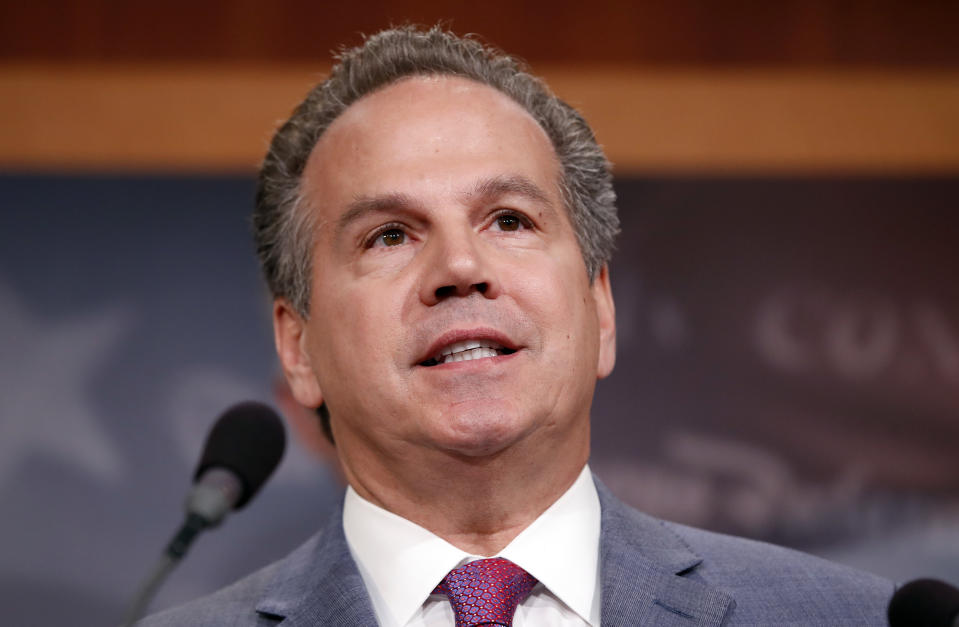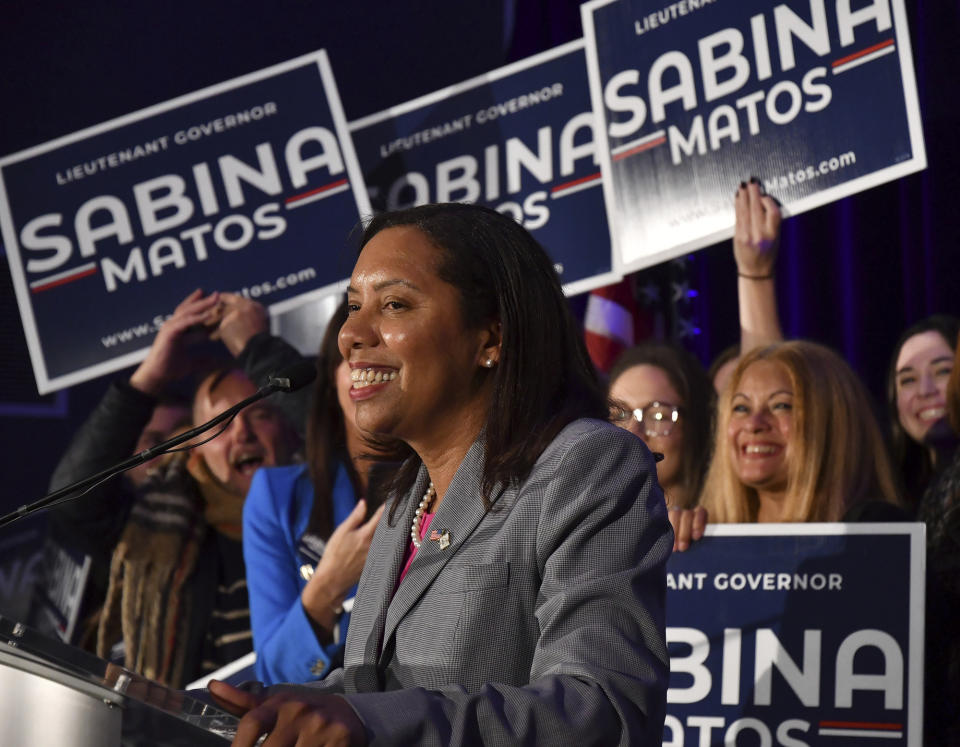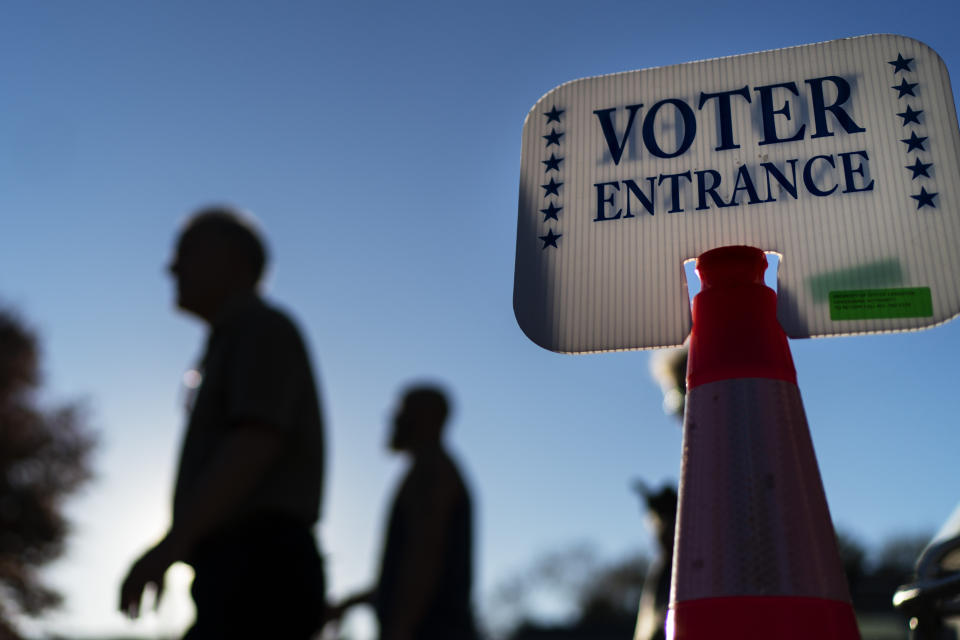AP Election Brief | What to expect in Rhode Island's special primaries
- Oops!Something went wrong.Please try again later.
- Oops!Something went wrong.Please try again later.
- Oops!Something went wrong.Please try again later.
WASHINGTON (AP) — A crowded field of candidates will be on the ballot in Rhode Island on Tuesday with an eye on replacing former U.S. Rep. David Cicilline, the seven-term Democrat who resigned in May to run a nonprofit foundation.
Among the 11 candidates competing in the special primary for the Democratic nomination are former Obama and Biden White House aide Gabriel Amo, state Sen. Sandra Cano, Lt. Gov. Sabina Matos and former state Rep. Aaron Regunberg. A 12th candidate, Don Carlson, suspended his campaign in late August after admitting he made a romantic overture to a student while he was a professor at Williams College. Carlson will remain on the ballot but has endorsed Cano.
Regunberg leads the field in fundraising, bringing in nearly $630,000 in contributions and the largest war chest heading into the campaign’s final three weeks. Amo was a close second in fundraising with $604,000 in contributions, followed by Matos, who raised $558,000. Cano ranked a distant fourth.
Matos faced a controversy earlier this summer over alleged fraudulent signatures on nomination papers submitted by her campaign to elections officials, but the state Board of Elections said in August that its review found “no obvious pattern of fraud."
On the Republican side, former Middletown Town Councilwoman Terri Flynn faces off against Gerry Leonard, a retired U.S. Marine colonel who served in Iraq and Afghanistan and has the endorsement of the state party.
The district has voted reliably for Democrats. Cicilline was first elected in 2010 and won his last five reelection bids with 60% of the vote or higher. Democrat Patrick Kennedy previously held the seat for 16 years.
Also on the Tuesday ballot is a special state Senate primary to complete the term of Maryellen Goodwin, the chamber’s majority whip until her death in April. Vying for the Democratic nomination are state Rep. Nathan Biah; Jacob Bissaillon, chief of staff to the state Senate president; Mario Mancebo; and social worker and Afghanistan War veteran Michelle Rivera.
The winner will advance to the Nov. 7 special general election and face Niyoka Powell, who is unopposed for the Republican nomination.
Here’s a look at what to expect on election night:
ELECTION DAY
The special primary in Rhode Island will be held on Tuesday. Polls close at 8 p.m. ET.
WHAT’S ON THE BALLOT
The Associated Press will provide coverage for three contests: the Democratic and Republican primaries in the 1st Congressional District and the Democratic primary for state Senate District 1. The winners will advance to the special general election on Nov. 7.
WHO GETS TO VOTE
Rhode Island voters registered with a specific political party may only cast ballots in their own party’s primaries. Unaffiliated or independent voters may participate in any party primary, but doing so will automatically affiliate them with that party in state records.
DECISION NOTES
Special primary elections tend to have lower voter turnout compared to those of regularly scheduled elections. In a close contest, particularly those with more than two candidates, the margin between the first- and last-place candidates may be a relatively small number of votes. This may slow the race-calling process as a handful of absentee, provisional or other untallied ballots could play a decisive role in determining the result.
The AP does not make projections and will declare a winner only when it’s determined there is no scenario that would allow the trailing candidates to close the gap. If a race has not been called, the AP will continue to cover any newsworthy developments, such as candidate concessions or declarations of victory. In doing so, the AP will make clear that it has not yet declared a winner and explain why.
There is no mandatory or automatic recount provision in Rhode Island, but recounts may be requested depending on the vote margin. For contests in which more than 100,000 votes are cast, a recount may be requested if the vote margin is less than 0.5 percentage points or fewer than 1,500 votes, whichever is less. For races in which between 20,000 and 100,000 votes are cast, the vote margin must be less than 1 percentage point or fewer than 500 votes. If the total number of votes cast is 20,000 or fewer, the margin to request a recount is 2 percentage points or fewer than 200 votes.
The AP may declare a winner in a race that is eligible for a recount if it can determine the lead is too large for a recount or legal challenge to change the outcome.
WHAT DO TURNOUT AND ADVANCE VOTE LOOK LIKE?
As of Aug. 1, there were almost 715,000 active voters registered in Rhode Island, according to state records. Of those, about 331,000 are independent or unaffiliated (46%), 285,000 are Democrats (40%) and 98,000 are Republicans (14%). Turnout for the 2022 primary for governor was 14% for Democrats and 3% for Republicans. In the 2020 presidential primaries, voter turnout was 13% for Democrats and 3% for Republicans.
As of Thursday, a total of 8,956 Rhode Island voters had cast ballots before Election Day. Democrats cast nearly 8,200 advance votes, 44% by mail and 56% cast early in person. Republicans cast 779 advance votes, 38% by mail and 62% early in person.
HOW LONG DOES VOTE-COUNTING USUALLY TAKE?
In the 2022 general election in the 1st Congressional District, the AP first reported results at 8:13 p.m. ET, or 13 minutes after polls closed. The election night tabulation ended at 10:49 p.m. ET with about 83% of total votes counted.



